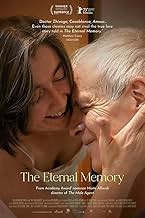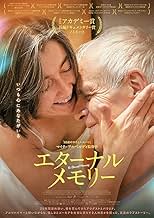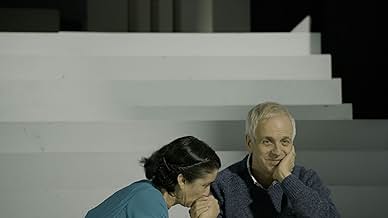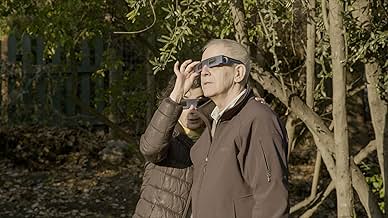ÉVALUATION IMDb
7,4/10
3,9 k
MA NOTE
Ajouter une intrigue dans votre langueAugusto and Paulina have been together for 25 years. Eight years ago, he was diagnosed with Alzheimer's disease. Both fear the day he no longer recognizes her.Augusto and Paulina have been together for 25 years. Eight years ago, he was diagnosed with Alzheimer's disease. Both fear the day he no longer recognizes her.Augusto and Paulina have been together for 25 years. Eight years ago, he was diagnosed with Alzheimer's disease. Both fear the day he no longer recognizes her.
- Nommé pour 1 oscar
- 14 victoires et 27 nominations au total
Gustavo Cerati
- Self
- (archive footage)
Pedro Lemebel
- Self
- (archive footage)
Javier Bardem
- Self
- (archive footage)
- (uncredited)
Avis en vedette
It's been said that one of the most cherished hopes for a loving relationship is that its partners inevitably have someone with whom they can grow old together, a time when they can warmly look back on their time as a couple with fondness and treasured memories. But what happens when something occurs that threatens to steal those precious recollections? That's one of the tragedies that can come with various forms of dementia, such as Alzheimer's Disease, a condition that seriously endangered the long-term loving partnership of renowned Chilean author/journalist Augusto Góngora and his wife, actress and former Minister of Culture Paulina Urrutia. But, rather than seeking seclusion in the wake of that diagnosis, Góngora insisted on making his story public, telling the tale of his condition and the diligent, compassionate efforts of Urrutia in acting as his caregiver, particularly in helping him hold on to his memory as fully and as long as possible. Their story is sensitively recounted in writer-director Maite Alberdi's moving documentary, a film that will simultaneously warm and break your heart. In telling their tale, this title explores the importance of preserving one's memories as a measure of one's identity and accomplishments, both personally and professionally. In Góngora's case, that involves the depth of his love for his wife, family and friends, as well as the critical role he played in making the Chilean public aware of the grotesque atrocities that unfolded in the wake of the country's 1973 coup d'etat and the restoration of the nation's cultural and artistic heritage after its return to democracy with the ouster of the Pinochet regime in 1990. Those recollections, in his view, represent a depth of courage that's to be preserved and not lost to the ravages of time and illness. This Oscar nominee for best documentary feature and its designation as one of 2023's top documentaries by the National Board of Review is a striking piece of filmmaking, one that's sure to touch virtually anyone who watches it (but be sure to keep those hankies handy). When we consider what can potentially be lost under circumstances like these, any efforts made to prevent that are truly heroic steps to be commended, and this film does an outstanding job at making that known, both in this case and as a practice to be employed whenever comparable conditions arise.
It's a documentary about a Chilean couple whose younger wife supports her husband, who has Alzheimer's.
Augusto Góngora was a prominent journalist and later cultural commentator on Chilean Public Television, beginning with the Pinochet years and following. He has two children; the documentary says nothing about his first wife. He has been in a relationship with actress Paulina Urrutia since 1997; they married in about 2017, several years after Góngora was diagnosed with Alzheimer's.
The documentary follows their interaction, especially during COVID-19, together with flashbacks to home movies and television clips from happier times when Góngora was practicing his profession. One of Góngora's post-Pinochet books reflected on cultural memories related to those difficult years. The documentary fashions a philosophical connection between the earlier cultural memory and the tragedy of Góngora's memory loss.
"The Eternal Memory" is a very personal movie. At first, I wondered if it was contrived reality TV, given the amiable manner in which the film initially portrays Góngora. But later, his confusion and increasing anxiety are plainly depicted. I'm not sure the memory linkage between Góngora's earlier professional life and later personal state is effective. But the film is gripping and is a challenging watch for people personally connected to someone with Alzheimer's Disease.
Augusto Góngora was a prominent journalist and later cultural commentator on Chilean Public Television, beginning with the Pinochet years and following. He has two children; the documentary says nothing about his first wife. He has been in a relationship with actress Paulina Urrutia since 1997; they married in about 2017, several years after Góngora was diagnosed with Alzheimer's.
The documentary follows their interaction, especially during COVID-19, together with flashbacks to home movies and television clips from happier times when Góngora was practicing his profession. One of Góngora's post-Pinochet books reflected on cultural memories related to those difficult years. The documentary fashions a philosophical connection between the earlier cultural memory and the tragedy of Góngora's memory loss.
"The Eternal Memory" is a very personal movie. At first, I wondered if it was contrived reality TV, given the amiable manner in which the film initially portrays Góngora. But later, his confusion and increasing anxiety are plainly depicted. I'm not sure the memory linkage between Góngora's earlier professional life and later personal state is effective. But the film is gripping and is a challenging watch for people personally connected to someone with Alzheimer's Disease.
Saw this at the 2023 Sundance Film Festival
"The Eternal Memory" is a story about Augusto and Paulina have been together for 25 years. Eight years ago, he was diagnosed with Alzheimer's disease. Both fear the day he no longer recognizes her. The film was one of the best documentaries from this years festival as the film was able to capture the relationship between the couple with heartwarming sequences. Director Maite Alberdi was able to perfectly capture life of having Alzheimer's disease and was able to make the characters very interesting to observe. Alzheimer's disease is a disease that is difficult to cure and it's interesting to see a story revolving around a real couple going through this process and seeing how they are able to resolve their conflicts.
Many archival footages used to describe the setting and situations were purposeful and well informative. Many of the dialogue moments were very interesting as it was very fun to observe and listen to the two main lead characters to talk about their lives and love. Along with other participants, there are some many interesting conversations provided and the tone goes from sometimes comedic and touching at the same time. From someone who has a relative who suffers from Alzheimer's disease, the film does hit home pretty hard.
Overall, it's a great documentary and it's one of the best at Sundance.
Rating: A-
"The Eternal Memory" is a story about Augusto and Paulina have been together for 25 years. Eight years ago, he was diagnosed with Alzheimer's disease. Both fear the day he no longer recognizes her. The film was one of the best documentaries from this years festival as the film was able to capture the relationship between the couple with heartwarming sequences. Director Maite Alberdi was able to perfectly capture life of having Alzheimer's disease and was able to make the characters very interesting to observe. Alzheimer's disease is a disease that is difficult to cure and it's interesting to see a story revolving around a real couple going through this process and seeing how they are able to resolve their conflicts.
Many archival footages used to describe the setting and situations were purposeful and well informative. Many of the dialogue moments were very interesting as it was very fun to observe and listen to the two main lead characters to talk about their lives and love. Along with other participants, there are some many interesting conversations provided and the tone goes from sometimes comedic and touching at the same time. From someone who has a relative who suffers from Alzheimer's disease, the film does hit home pretty hard.
Overall, it's a great documentary and it's one of the best at Sundance.
Rating: A-
Greetings again from the darkness. Augusto and Paulina are a real couple facing real challenges in the real world. Their challenges aren't related to where to head for dinner or whether Augusto will leave the toilet seat up or down. No, their daily challenges are whether Augusto will wake up and recognize his wife, or even know his own name. Chilean Documentarian Maite Alberti climbs inside this relationship to show us the real impact of Alzheimer's Disease, and does so expertly and intimately.
Augusto Gongora was a professional News Reporter/Journalist during the Pinochet regime, and Paulina Urrutia was a successful actor ... both well known in their country. We even see clips and archival newsreels of Augusto's work. However, filmed during COVID, almost the entirety of the film is focused on these two people taking each day as it comes ... the good days and the not-so-good days. And perhaps 'moments' is a better measure than days, as this cruel disease can shift quickly. Paulina handled much of the camera work so the director and crew could keep safe distance during the pandemic, and the result is a few blurry shots, none of which detract from what we are meant to see.
Paulina helps Augusto with his memory of work and kids. She helps him take a shower. She reads to him when they take walks, and she cringes as he rides a bicycle. She helps him with his eye protection as they view the eclipse. They even treasure the time they can dance together. There are many times they share a laugh, and there are times Paulina cries alone or Augusto appears lost. Mostly they have their tender moments which define the relationship that they so want to hold on to ... all while surrounded by Augusto's lifelong collection of books that fill the house - most of which he can no longer read.
Theirs is a love story. And it's real.
Augusto Gongora was a professional News Reporter/Journalist during the Pinochet regime, and Paulina Urrutia was a successful actor ... both well known in their country. We even see clips and archival newsreels of Augusto's work. However, filmed during COVID, almost the entirety of the film is focused on these two people taking each day as it comes ... the good days and the not-so-good days. And perhaps 'moments' is a better measure than days, as this cruel disease can shift quickly. Paulina handled much of the camera work so the director and crew could keep safe distance during the pandemic, and the result is a few blurry shots, none of which detract from what we are meant to see.
Paulina helps Augusto with his memory of work and kids. She helps him take a shower. She reads to him when they take walks, and she cringes as he rides a bicycle. She helps him with his eye protection as they view the eclipse. They even treasure the time they can dance together. There are many times they share a laugh, and there are times Paulina cries alone or Augusto appears lost. Mostly they have their tender moments which define the relationship that they so want to hold on to ... all while surrounded by Augusto's lifelong collection of books that fill the house - most of which he can no longer read.
Theirs is a love story. And it's real.
Absolutely captivating! I was so lost in the story that I had no idea how much time had gone by. The storytelling, as it moves from past to present, felt like an emotional symphony. Understanding Spanish made it so much more moving. Felt like watching The Notebook for the first time and in a documentary. A masterpiece that stirred my emotions like no other film in years.
Moreover, this documentary highlights the profound talent of women directors, showcasing their ability to craft narratives that resonate deeply. It's a testament to the need for more recognition for this exceptional contribution to the film industry. Deserves a much higher rating!
Moreover, this documentary highlights the profound talent of women directors, showcasing their ability to craft narratives that resonate deeply. It's a testament to the need for more recognition for this exceptional contribution to the film industry. Deserves a much higher rating!
Le saviez-vous
- AnecdotesAugusto Góngora, used to be the host in the Chilean broadcasts of the Academy Awards. Now, the story of his struggle with Alzheimer's is nominated for the Academy award for best documentary feature.
- Citations
Augusto Góngora: I want to see my friends and something strange is happening here.
- ConnexionsFeatured in The Oscars (2024)
- Bandes originalesA Dónde Van
Written, composed and performed by Silvio Rodríguez
Meilleurs choix
Connectez-vous pour évaluer et surveiller les recommandations personnalisées
- How long is The Eternal Memory?Propulsé par Alexa
Détails
Box-office
- Brut – États-Unis et Canada
- 67 594 $ US
- Brut – à l'échelle mondiale
- 118 866 $ US
- Durée1 heure 25 minutes
- Couleur
- Mixage
- Rapport de forme
- 1.85 : 1
Contribuer à cette page
Suggérer une modification ou ajouter du contenu manquant

![Regarder Trailer[OV]](https://m.media-amazon.com/images/M/MV5BYzMzYTU5NTItNDYxZC00NzUzLWJjMTktZDg4YjkwNzY5ZmEwXkEyXkFqcGdeQXRyYW5zY29kZS13b3JrZmxvdw@@._V1_QL75_UX500_CR0)
























